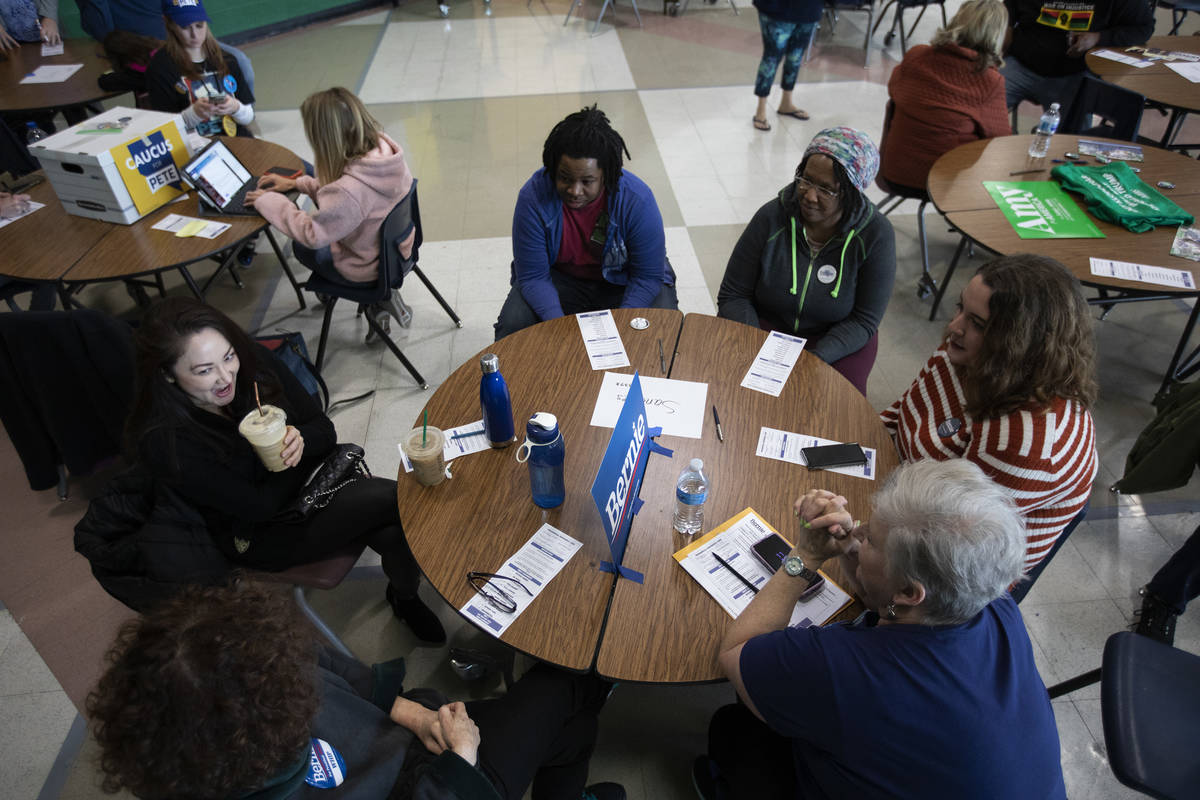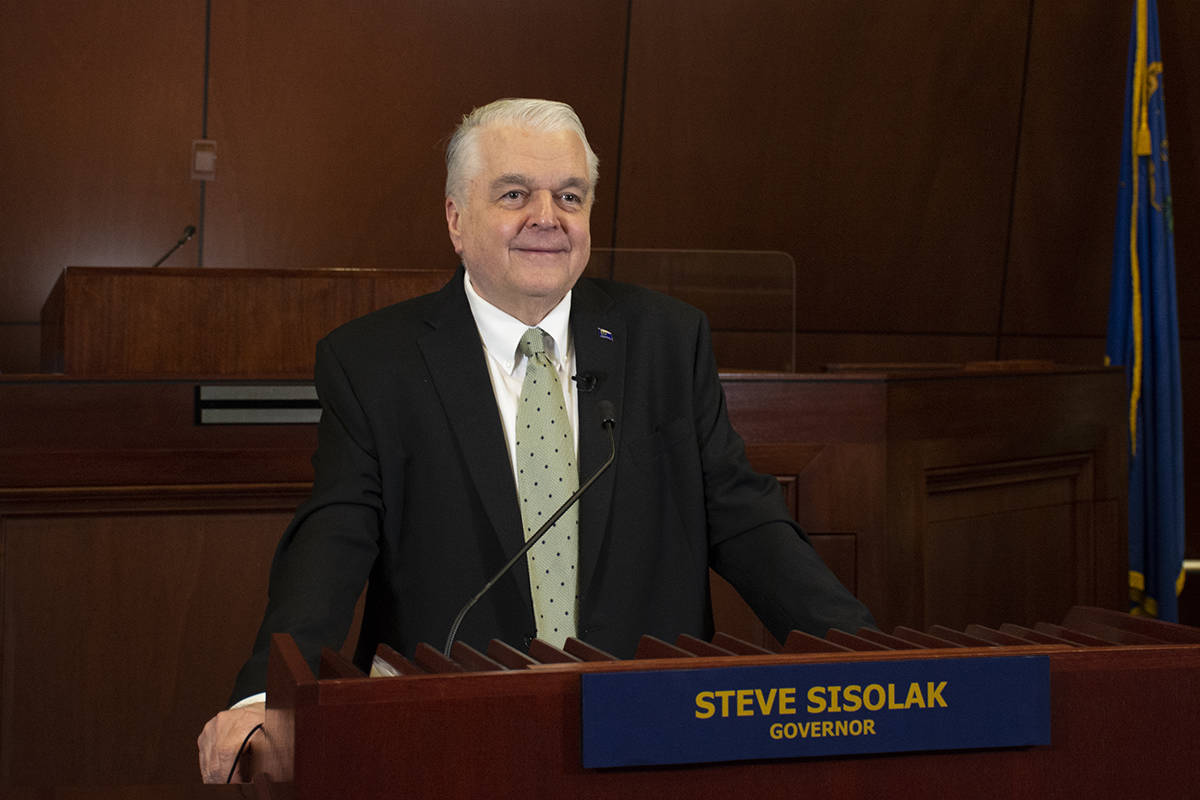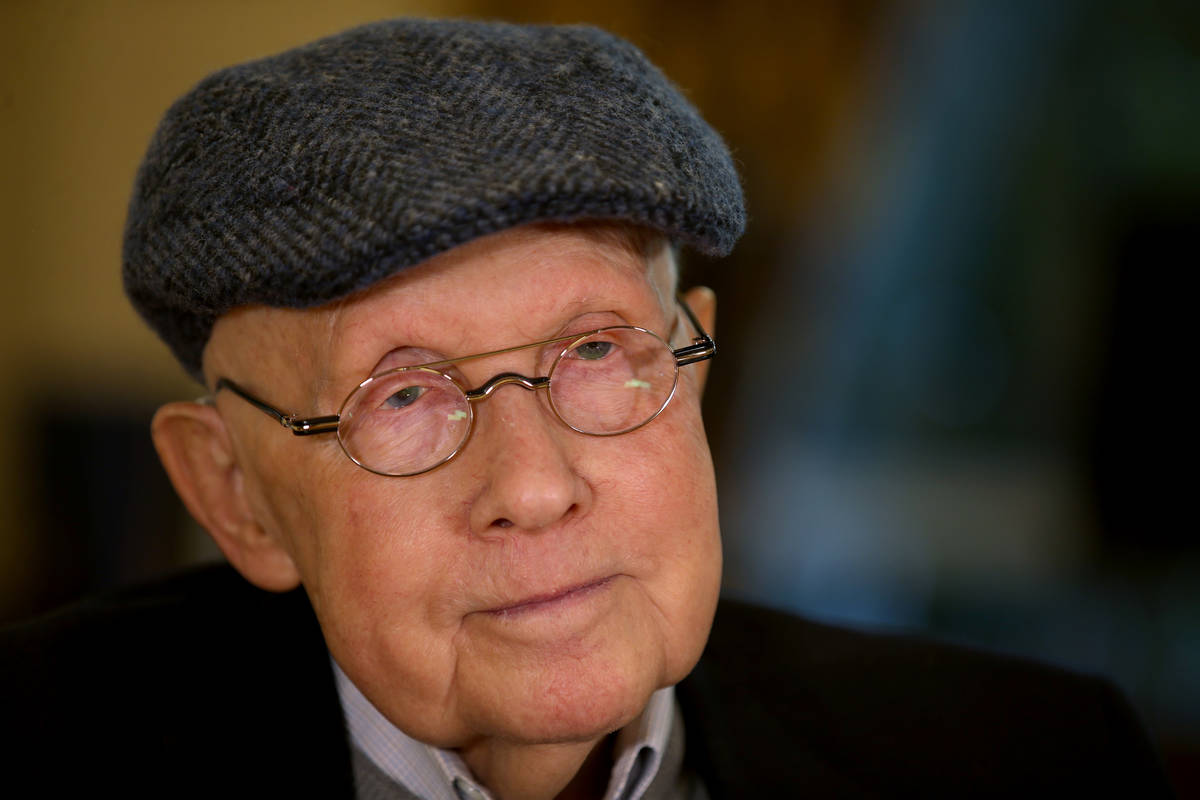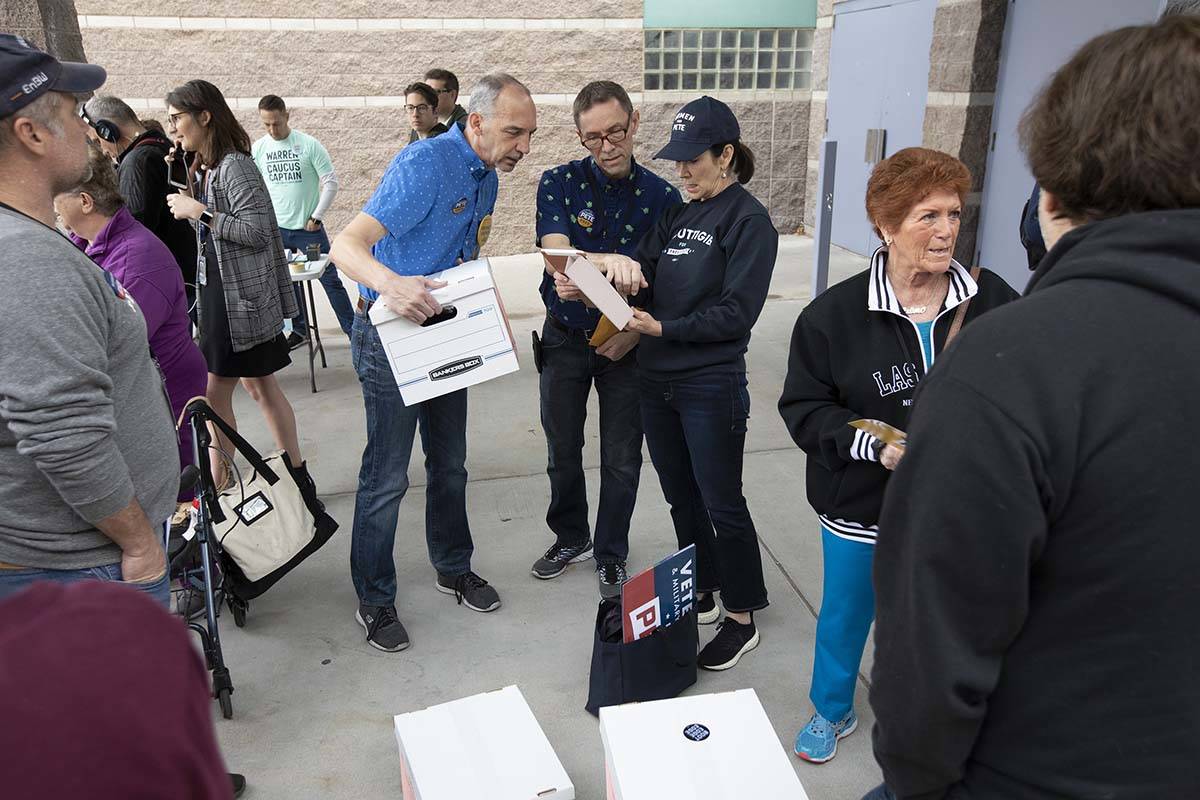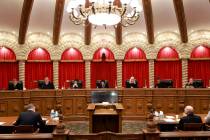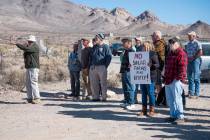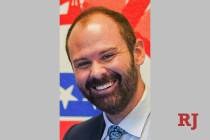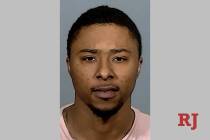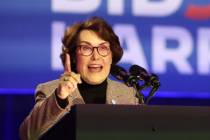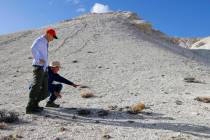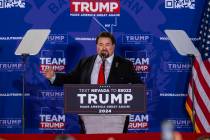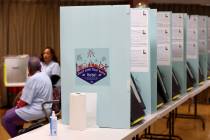Nevada caucuses may be a thing of the past
The days of herding relative strangers into Nevada high school gyms for an all-day democracy exercise peppered with puzzling math equations that somehow make or break political futures may soon be at an end.
At least, they will be if the state’s power brokers get their way. And they often do.
“My No. 1 priority is getting rid of the caucuses,” said Harry Reid, former U.S. Senate majority leader and still very much the face of Nevada Democrats. “They don’t work. It was proven in Iowa. We did OK here, but the system is so unfair.”
Technical difficulties derailed Iowa’s Democratic caucuses last year, leading to Nevada’s move away from similar technology that would help hundreds of sites feed numbers used in “caucus math” — a system joyously explained by political organizers and understood by sheer dozens of Nevadans as the way the state awards delegates for state and national party conventions.
Though Nevada’s party avoided similar pitfalls, Reid and a growing coalition believe a presidential primary would allow far more voters to participate and seems to be the anecdotal will of the people.
Nevada Assembly Speaker Jason Frierson will soon carry a bill to kill the caucuses. The legislation wouldn’t need bipartisan support with Democrats in the firm majority, but it may get some anyway, as Republicans contacted by the Review-Journal were open to the idea.
But Frierson also plans to join Reid and other state Democrats in advancing a far more politically challenging notion: That Nevada should be the first state in the nation to weigh in on presidential candidates.
“We’re one of the most diverse states in the country, and it would behoove a candidate to come and make their pitch to voters here,” Frierson said. “The political influence is moving west, and Nevada is seen as a very good gauge of where the country is at.”
The end of the caucuses
The move away from caucuses is not a surprise, as elected officials including Gov. Steve Sisolak called for its demise in the days that followed the Feb. 22 statewide contests.
Nevada State Democratic Party Executive Director Alana Mounce said she was proud of the work her staff and organizers did to run a successful caucus in trying times last year, but it’s ready to move on.
“We know moving forward it’s time to move to a primary process and time to have Nevada be the first early state in 2024,” Mounce said.
Although the state party has built up considerable organizing muscle in part because of the hands-on nature of caucuses, Mounce said the end of caucuses would shed a considerable financial and time-consuming weight that would allow for more focus on registering new voters and recruiting volunteers.
Democrats preparing campaign
With a new Democratic National Committee led by Jaime Harrison, a former Senate candidate and South Carolina Democratic Party chair, and Iowa’s pitfalls just a year in the rearview, Nevada is preparing to make a play.
“There are a lot of changing names and faces at DNC, and what you’re seeing, possibly, is the development of a campaign to make the argument for Nevada to be No. 1, which I’m ecstatic for,” said Alex Goff, one of two DNC members elected by the state party.
“I grew up in Mississippi,” Goff continued. “I joined the U.S. Marine Corps and served across the country and in other countries before moving here. There are so many people here with those stories. Their jobs brought them here, and they became Nevadans. You get a nice cross-section of the country.”
Nevada’s growing, diverse population and bellwether status in the West — a region where Democrats have grown in strength as the Midwest has grown more unpredictable — will be two major platforms for the campaign to stand on. The state also boasts a large union population and a mix of college and non-college educated voters.
But Goff also noted Nevada’s logistical strength for campaigns: Two urban centers holding about 85 percent of the population, situated in large media markets with easy travel between them.
Mounce believes the strength and organization of her party will appeal to a Harrison-led DNC because of his time leading South Carolina’s party.
Allison Stephens, the state’s other DNC member, said she too will “do everything I possibly can” for Nevada to be first on the calendar, but she cautioned against pushing the national party too hard.
“We don’t want to compromise our position as No. 3 in the nation,” Stephens said. “We cannot fall below third. If changing to a primary would jeopardize our early state status, I would be concerned. We do have to work within the parameters of the party.”
National implications
The DNC will continue to review the previous cycle for at least another two months before discussing any possible changes to the nominating calendar.
“Every four years, the DNC looks back at what worked and what didn’t work, and the DNC’s Rules and Bylaws Committee will continue to evaluate all areas of our nominating process and make recommendations for any changes,” spokesman David Bergstein said.
This review is expected to be complete on March 31, at which point the DNC as a whole will take up the conversation.
On Wednesday, White House press secretary Jen Psaki said it was “too soon” to discuss the nominating calendar when asked during her daily briefing.
“We are certainly not focused on the next political campaign here quite yet, and we don’t have any point of view to share on the order of the presidential nominating contests, though Nevada’s a little warmer,” she said. “But you know, all great states.”
Iowa and New Hampshire, the two states that nominate before Nevada, are mounting their own campaigns to stay put, and other states are likely to make their own pushes to move up.
Frierson is sensitive to this.
“We will have to work through (the bill’s) language and work with the national parties — both Democrats and Republicans — and convince them of Nevada’s importance in the West,” he said.
Frierson noted the Legislature has no control over other states, which could simply move their own nomination dates further ahead absent a national calendar agreement. New Hampshire, for example, already has a state law declaring it must hold the first presidential primary election.
He said he is also working with local election officials on a cost estimate for the state, which would assume the cost burden currently borne by the state parties in the caucus system.
The typical Nevada primary, held in June for local and statewide offices, would remain, Frierson said. The new primary would be used only for selecting presidential candidates.
Republicans will wait and see
Eric Roberts, executive director of the Assembly Republican Caucus, said the demise of the caucuses could garner mixed support from his party.
“My gut feeling without talking to anyone about it is that the more conservative Republicans may want to keep (the caucuses), and the more moderates may want to go to a primary,” he said.
Roberts noted the Republican-controlled 2015 Legislature attempted a similar change, but the bill died.
Unlike 2020, Republicans will have a competitive presidential nominating process in 2024, and some state leaders have adopted a wait-and-see approach as the empowered Democrats look to change state law.
State Sen. James Settelmeyer, the Republican minority leader, said he supports the change from caucuses to a primary, but he would like to see the presidential nomination combined with Nevada’s traditional June primary, which would keep costs the same.
“I don’t think states should vote early,” he said. “I don’t like the idea of only a small percentage of the nation or a few states determining the leader of the free world.”
Settelmeyer said he carried a bill to switch to a primary in the past. Bipartisan support is possible if Democrats are willing to discuss the changes and work through committees.
“I think the concept of trying to do something to increase voter participation is very appealing, and I believe we need to do that,” Settelmeyer said.
The senator also said he believes that bipartisan support from the Legislature would help the state make a case to the national parties.
“I would hope (the parties) would respect legislators in this state,” he said. “If all of our Republicans voter in favor of this, that would carry weight. But if all of us rejected it, that would also mean something.”
Nevada Republican Party Chair Michael McDonald said he personally likes the caucus system, as it spurs engagement within the party, but he is willing to adapt if Nevadans prefer a primary.
McDonald said his party’s caucus went so poorly in 2012 that it nearly lost its first-in-the-West status on the Republican nominating calendar, but the system saw success in 2016.
“If they’re run right, they’re great,” McDonald said. “But they can also be a disaster.”
McDonald, also one of the state’s Republican National Committee members and a lifelong Nevadan, said he supports Nevada being moved up in the calendar, but it must be done with cooperation from the national parties and other states.
“I think anyone from here would want us to be first,” he said, “but you have to have respect for the party and your fellow states in order to get respect back.”
Contact Rory Appleton at rappleton@reviewjournal.com or 702-383-0276. Follow @RoryDoesPhonics on Twitter.



